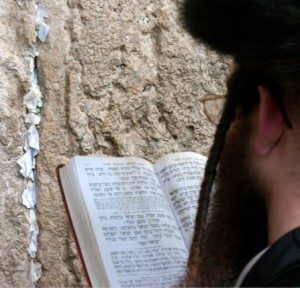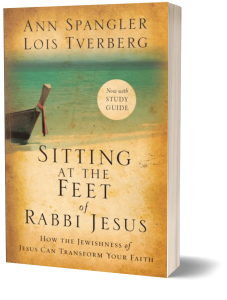by Lois Tverberg
 It’s good to have a taste of Jesus’ customs and culture, but as Christians, our goal is not to become more Jewish, but rather to become more like Jesus.
It’s good to have a taste of Jesus’ customs and culture, but as Christians, our goal is not to become more Jewish, but rather to become more like Jesus.
There is, however, one Jewish practice that all of us would benefit from, and that is adopting a type of Jewish prayer which can transform a person’s spiritual life. These have been used for thousands of years, even back to New Testament times.
What was this wonderful style of prayer? It is the habit of “blessing” the Lord. It is an attitude of continual thankfulness toward God that expresses itself through brief prayers that acknowledge him as the source of every good thing. It ultimately comes from the Scriptures, when Moses admonished the Israelites not to forget the Lord:
When you have eaten and are satisfied, you shall bless the LORD your God for the good land which He has given you. Beware that you do not forget the LORD your God…(Deut. 8:10-11)
It was easy for the Israelites to cling to God in the desert, but very easy to forget God when times got better and they prospered in the Promised Land. The cure, according to the rabbis, was to continually remind themselves of God’s care by uttering a short prayer of thanks, to “bless the Lord.”
This pervasive act of prayer kept God’s presence and love continually on their minds. Jesus and Paul both would have practiced it, and Paul may have had it in mind when he told Christians to “Be joyful always; pray continually; give thanks in all circumstances” (1 Thes. 5:16-18).
A Practice from Before Jesus’ Time
Before the time of Christ, the Jews developed a number of short blessings to be said whenever the occasion arises, in addition to saying longer prayers in the morning and evening. Some of them are now prayed in the daily synagogue service. Modern custom begins all of them by saying, “Blessed are you, oh Lord our God, King of the Universe.”
The idea is not to bless objects and people, in our usual Christian sense of the word, but to bless the Lord, with the understanding that we are focusing on him as the source of all blessing. The word for bless, barak also means “to kneel,” suggesting that when we bless God, we mentally bow on our knees to worship him.
In Jesus’ day the first line was probably just “Blessed is he,” but the rabbis felt it was important to be reminded that God is King over us in order to “receive on ourselves the Kingdom of God,” so they added the rest of the line later. So in these prayers we mentally kneel toward God, remind ourselves of his goodness, and that he is our King.
 In the gospels it says that Jesus “took the bread and blessed.” (The NIV says “gave thanks” but more literal translations use the word “blessed.”) Some translations incorrectly add the word “it,” to sound as if Jesus “blessed it.” But the idea of blessing the Lord is to thank him for providing, not to confer holiness on the food. Some of our table prayers even reflect this misunderstanding.
In the gospels it says that Jesus “took the bread and blessed.” (The NIV says “gave thanks” but more literal translations use the word “blessed.”) Some translations incorrectly add the word “it,” to sound as if Jesus “blessed it.” But the idea of blessing the Lord is to thank him for providing, not to confer holiness on the food. Some of our table prayers even reflect this misunderstanding.
We know what words he said – most likely, “Blessed is he who brings forth bread from the earth.”
When Jesus did miracles, the people “glorified God,” perhaps exclaiming, “Blessed is he who has performed a miracle in this place!” It was customary to pray this blessing at a site where a miracle occurred. So when Jesus healed ten lepers and only one, a Samaritan, came back and loudly blessed God, Jesus wondered why the other nine hadn’t returned to do the same thing (Lk 17:12 -19).
~~~~~
 For more about this rich practice of prayer, see the chapter “For Everything a Blessing” in Sitting at the Feet of Rabbi Jesus.
For more about this rich practice of prayer, see the chapter “For Everything a Blessing” in Sitting at the Feet of Rabbi Jesus.
(Images courtesy of kolya at flickr.com.)

